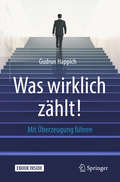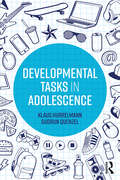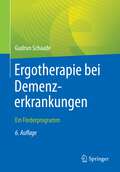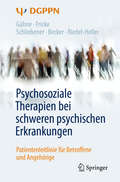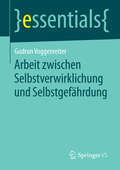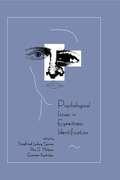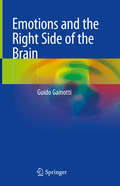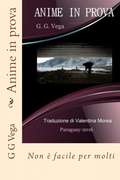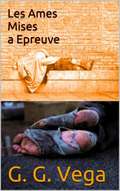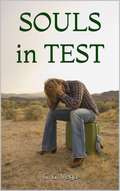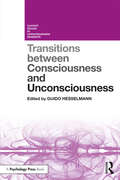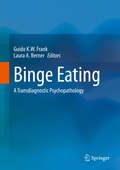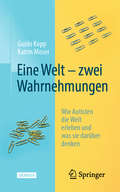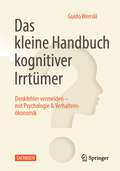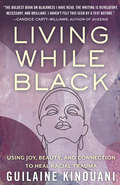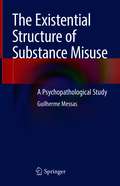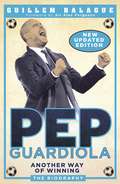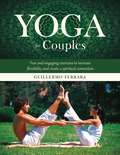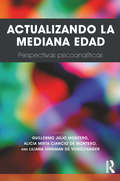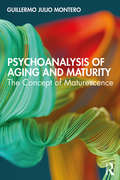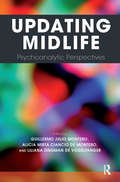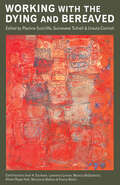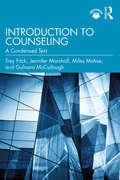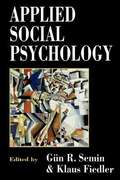- Table View
- List View
Was wirklich zählt!: Mit Überzeugung führen
by Gudrun HappichAn der Spitze stehen, erfolgreich sein und sich trotzdem ohnmächtig, überfordert, unzufrieden und einsam zu fühlen – das kommt häufiger vor als manche glauben. Warum? Um Erfolg und Erfüllung verbinden zu können, benötigen wir den richtigen Platz, der unseren Stärken und Talenten entspricht. Ähnlich wie Pflanzen verkümmern wir, wenn die Rahmenbedingungen uns nicht entsprechen. Wenn wir dagegen unser (Berufs-) Leben im Einklang mit unserer inneren Überzeugung gestalten, können wir Leistung mit Leidenschaft und Leichtigkeit verbinden. In diesem Buch lernen Sie vier Top-Führungskräfte kennen. Ihre Karrieren, Ängste, Zweifel und Hoffnungen sind exemplarisch für viele andere. Begleiten Sie sie dabei, wie sie ihren persönlichen Weg zu Erfolg und Erfüllung gehen und machen Sie sich selbst auf den Weg. Sie finden dazu viele Praxis-Tipps und Übungen. Von der vielfach bewährten Vorgehensweise profitieren der Einzelne und das Unternehmen – denn Mensch und System lassen sich nicht trennen. Ein Mensch in der falschen Position kann ein ganzes Unternehmen gefährden. Andersherum: Wer wirklich überzeugt ist, von dem was er tut, hat immer Erfolg – und Spaß daran.Dieses Sachbuch ist eine Weiterentwicklung des erfolgreichen Fachbuchs "Was wirklich zählt!", Springer Gabler 2014.
Developmental Tasks in Adolescence
by Klaus Hurrelmann Gudrun QuenzelThe topic of adolescent development in Europe is one which has received little academic attention in recent years. Developmental Tasks in Adolescence makes an exciting contribution to the field by applying socialisation theory to four major developmental tasks of life: Qualifying, Bonding, Consumption and Participation, arguing that if the tasks in these areas are mastered, then personal individuation and social integration can take place, a prerequisite for the formation of self-identity. In highly developed societies, adolescence encompasses a period of about 15 years on average. Puberty, or the transition from childhood, starts earlier and earlier, and the transition to adulthood is increasingly postponed. Developmental Tasks in Adolescence proposes that the way in which adolescents master the tasks of everyday life has become a pattern of orientation for the life stages which follow because of the new lifestyle requirements that are typical for modern democratic societies. Today, a life full of uncertainties and ambiguities is no longer limited to adolescence, but rather continues into adulthood. Hurrelmann and Quenzel's sociological approach is valuable reading for students and academics in psychology, sociology, education, social work and youth studies, and for those on professional training courses in these fields.
Ergotherapie bei Demenzerkrankungen: Ein Förderprogramm
by Gudrun SchaadeDer Band stellt ein praxiserprobtes Förderkonzept für die Arbeit mit an Demenz erkrankten Patienten vor und liefert zugleich notwendiges Grundlagenwissen. Insbesondere wird aufgezeigt, wie gängige rehabilitative Behandlungsansätze mit anderen Methoden kombiniert werden können, die speziell auf die Möglichkeiten von Demenz-Patienten abgestimmt sind. Handlungsanleitungen und ein umfangreicher Fundus an Übungsvorschlägen liefern Anregungen für die praktische Umsetzung. Geeignet als Einstiegslektüre für einen anspruchsvollen Aufgabenbereich.
Psychosoziale Therapien bei schweren psychischen Erkrankungen: Patientenleitlinie für Betroffene und Angehörige
by Thomas Becker Uta Gühne Ruth Fricke Gudrun Schliebener Steffi G. Riedel-HellerDiese Patientenleitlinie ist die Patienten- und Angehörigenversion der S3-Leitlinie „Psychosoziale Therapien bei schweren psychischen Erkrankungen“, die in der Reihe S3-Praxisleitlinien in Psychiatrie & Psychotherapie federführend durch die Deutsche Gesellschaft für Psychiatrie und Psychotherapie, Psychosomatik und Nervenheilkunde (DGPPN) herausgegeben wurde.Die Patientenleitlinie wurde 2018 analog zur zugrundeliegenden Behandlungsleitlinie überarbeitet und um neue Interventionen ergänzt: In der Neuauflage werden erstmals Maßnahmen zur Unterstützung der körperlichen Gesundheit der Betroffenen vorgestellt und neben Selbstmanagementstrategien und computergestützten Ansätzen systematisch Hilfen durch Genesungsbegleiter beschrieben. Die Neuauflage folgt stärker als bisher dem Recovery-Gedanken und ist deshalb für schwer psychisch kranke Menschen auf der Suche nach den passenden Therapien ein willkommener Begleiter.
Arbeit zwischen Selbstverwirklichung und Selbstgefährdung (essentials)
by Gudrun VoggenreiterArbeit ist in einem umfassenden Verständnis die Vorbedingung allen Lebens, ist Leben doch durch Bewegung und damit Veränderung, Umgestaltung definiert. Der Mensch möchte sein Selbst in eben diesen Umgestaltungen wiedererkennen, er möchte Spuren hinterlassen. Dabei kommt er häufig in Konflikt mit dem Wollen der Anderen - Arbeit wird mühsam. Der Weg von der Selbstverwirklichung zur Selbstgefährdung ist vorgezeichnet. In den letzten Jahrzehnten scheint sich dies zu verschärfen. Die Rückbesinnung auf die Sinn-Dimension von Arbeit und die Umgestaltung einiger betriebswirtschaftlicher und politischer Rahmenbedingungen wären ein großer Beitrag zur Gesundheit einer Gesellschaft. Vorschläge dazu werden in der vorliegenden Arbeit vorgestellt. Es deutet einiges darauf hin, dass ein Umbau unserer Arbeits- und Lebenswelten erforderlich ist, der durchaus die Grundfesten unserer jetzigen Gesellschaftsordnung und individuellen Überzeugung berühren wird.
Psychological Issues in Eyewitness Identification
by Siegfried Ludwig Sporer Roy S. Malpass Guenter KoehnkenWhy do police officers, investigators, prosecutors, judges, and others with an interest in eliciting accurate memory-based testimony need to inform themselves of the research literature in experimental psychology that addresses the question of witness memory? The answer is straightforward, from the perspective of a simple cost/benefit analysis. As with so many matters in the administration of public funds, effectiveness holds important rewards. Those who investigate crimes and decide which line of investigation to pursue and which line to postpone or set aside, necessarily make judgments about the likely guilt of suspects based on the information at hand. If they can make these judgments with a high degree of accuracy, everyone benefits. For many cases eyewitness identification is an important component of evidence, prosecution, and plea negotiation. If witness identification is correctly implemented, investigators and prosecutors can make their judgments effectively, and focus their resources more efficiently. A major component of effectiveness requires avoiding expending scarce resources on erroneous prosecutions. It is in everyone's interest to make the best use of the memory of witnesses: to preserve it without changing it; to render it maximally accessible; to provide an environment in which witnesses feel free to report their recollections; and to accurately assess the probable validity of the witness's report, regardless of the witness's certainty or doubts about its accuracy. This volume gathers evidence from various research domains on eyewitness testimony. Although many of the studies discussed deal with eyewitness identification, it is noteworthy that many of them also touch upon other areas of concern to eyewitness researchers, including chapters on: *voice recognition by humans and computers, with particularly detailed instructions on conducting voice "lineup," *differential aspects of recognition memory in children, *elderly eyewitness' memory, *problems of cross-racial identification, *psychological aspects of facial image reconstruction techniques, *person descriptions, *particular benefits of reinstating context as a means to improve eyewitness memory, *problems associated with various research paradigms in the eyewitness arena, and *recommendations on how to conduct lineups and photospreads and their proper evaluation. Differentiated from other literature on this topic by its non-technical language and accessibility to non-professionals, this volume covers a great deal of ground, raises a host of questions, settles some others, and points the way to more effective use and evaluation of what eyewitnesses have to say.
Emotions and the Right Side of the Brain
by Guido GainottiThis book focuses on asymmetries in brain structure and their role in emotional functions (such as amygdala in emotional comprehension, the ventro-medial prefrontal cortex in the integration between cognition and emotion and in the control of emotional reactions, and the anterior insula in the experience of emotions). The idea of hemispheric asymmetries in emotional comprehension and expression was first proposed about a century after the first studies showing that the left hemisphere is dominant for language, but it quickly became very popular. Initial investigations considered the right and left hemispheres as single functional units, but in the last few years several researchers have focused attention on asymmetries in brain structures playing a critical role in specific components of emotional functions. Furthermore, interesting data have been obtained by studying emotional and behavioural disorders of patients with asymmetrical forms of frontal or temporal variants of fronto-temporal degeneration. Elaborating on these subjects requires, on the one hand, a consolidated understanding of how models concerning the relationships between emotions and hemispheric asymmetries evolved in time and, on the other hand, a sound interdisciplinary knowledge of psychology (nature, components and hierarchical organization of emotions) and neuroscience (neuroanatomy). This volume – intended for neurologists, neuroscientists and psychologists – pursues an organic and consistent approach to provide an overview of these complex and fascinating issues.
Anime in prova
by Guido Galeano Vega Valentina MoreaIl libro Anime in prova è ispirato alla realtà che soffrono ogni giorno persone disagiate per le strade, sotto i ponti, vivendo come o peggio dei cani, mentre attorno esistono persone che avendo un eccesso di risorse, che potrebbero tender loro la mano, alzarli e aiutarli a rimettere in piedi le proprie vite, semplicemente li disprezza e li ignora. Nessuno sceglierebbe questo tipo di esperienza per se stesso, se si trovano li è perché le loro vite non sono state facili. Il proposito del libro è risvegliare la compassione che ogni essere umano possiede e deve possedere nella sua anima verso i propri simili caduti in disgrazia.
LES AMES MISES A L'EPREUVE
by Guido Galeano Vega Valerie Guilloteau FernándezDe nos jours, le monde jouit de la possibilité de nager dans l’abondance, cependant nombreuses sont les personnes qui souffrent de carences extrêmes. Ce livre relate l’expérience d’un jeune homme obligé d’abandonner pour la première fois son foyer, et pour la première fois aussi d’affronter les carences que provoque cette expérience pour laquelle personne n’a été préparé. C’est l’histoire de milliers de personnes dans le monde, et l’objectif de ce livre est d’éveiller chez chaque lecteur la compassion envers ces personnes dont les âmes connaissent les épreuves les plus dures de l’existence humaine.
Souls in Tests
by Guido Galeano VegaAt present, the world enjoys the option of mega abundance, however, at the same time many people are suffering from extreme deficiencies. Souls in tests This book deals with the experience of a young man who is forced to leave home for the first time, and for the first time to suffer all the shortcomings that this experience represents for which nobody has prepared you. It is the story of thousands of people in the world, and the purpose of this book is to awaken in each person who reads it, compassion towards these people, whose souls are passing the hardest tests of the experience of human existence.
Transitions Between Consciousness and Unconsciousness (Current Issues in Consciousness Research)
by Guido HesselmannThe empirical study of consciousness is in constant progress. New ideas and approaches arise, methods are being debated and refined, and experimental research over the last two decades has produced a rich body of data, acquired in the aim to better understand consciousness and its neural underpinnings. This volume synthesises this data, focusing on how to understand the relations and transitions between consciousness and unconsciousness alongside exploring and distinguishing conscious experience of sensory stimuli and unconscious states. Bringing together leading academics and promising young scientists from across the fields of psychology and neuroscience, Transitions between Consciousness and Unconsciousness discusses controversial topics and ideas, providing an overview of current research trends and opinions, as well as perspectives on theoretical and methodological questions. This is an essential volume for consciousness researchers and students from across psychology, neuroscience and philosophy, as well as those researching modes of visual processing.
Binge Eating: A Transdiagnostic Psychopathology
by Guido K. W. Frank Laura A. BernerThis book provides a comprehensive overview of our current understanding of binge eating, which is characterized by the uncontrollable consumption of large amounts of food in a discrete time period. Written by experts on eating disorders, it first introduces the phenotype of binge eating, including its epidemiology and assessment. It then describes the underlying neurobiological alterations, drawing on cutting-edge animal models and human studies to do so. In addition, it extensively discusses current treatment models, including medication, psychotherapy, self-interventions and disease prevention. Lastly, an outlook on the future research agenda rounds out the coverage. Given binge eating’s current status as an under-researched symptom, but one shared across many eating disorders, this book provides an up-to-date, integrative and comprehensive synthesis of recent research and offers a valuable reference for scientists and clinicians alike.
Eine Welt – zwei Wahrnehmungen: Wie Autisten die Welt erleben und was sie darüber denken
by Guido Kopp Katrin MoserZwei Menschen. Der eine in der Welt scheinbar vollkommen selbstverständlich zu Hause, die andere gefühlt gestrandet auf einem fremden Planeten. Der eine agiert intuitiv in einer für ihn geordneten Welt, die andere sucht nach Hilfe, um das alltägliche Chaos zu verstehen.In diesem erzählerischen und auf realen Begegnungen basierenden Sachbuch werden alltägliche und gemeinsam erlebte Situationen einer Autistin namens Fenna und eines Nicht-Autisten, in Person ihres Therapeuten Herrn Armona, gegenübergestellt und reflektiert. Anhand zahlreicher Briefe und schriftlich dokumentierter Gedanken der beiden Protagonisten sowie wissenschaftlicher Hintergrundinformationen zu einzelnen Aspekten der Autismus-Spektrum-Störungen gelingt eine schrittweise Annäherung zu einem gegenseitigen Verständnis für den Blick des jeweils anderen auf die gemeinsam erlebte Wirklichkeit - und eine Möglichkeit, vom jeweils anderen zu lernen.Werfen Sie gemeinsam mit Fenna und Herrn Armona einen Blick auf ganz alltägliche Situationen (vom ersten Kennenlernen über einen Einkauf oder Arztbesuch bis hin zur gemeinsamen Autofahrt) und lernen Sie die Perspektive einer Autistin und eines Nicht-Autisten kennen und verstehen.
Das kleine Handbuch kognitiver Irrtümer: Denkfehler vermeiden – mit Psychologie & Verhaltensökonomik
by Guido Wenski„Irren ist menschlich" – das alte Sprichwort wird auch durch die Wissenschaft bestätigt: Uns Menschen unterlaufen ständig Denkfehler. Dieses Buch stellt über 300 solcher kognitiver Irrtümer und Verzerrungen, die im Alltag auf uns lauern, auf unterhaltsame Art vor: Ob trügerische Erinnerungen, Beeinflussung unserer Entscheidungen durch Gefühle, Phänomene der Selbstüberschätzung, falscher Umgang mit Geld oder Wahrscheinlichkeiten oder sogar Sichtweisen, die zu Diskriminierung führen – unser komplexes Gehirn neigt zu vorhersagbaren Schnellschüssen, die in der Vorzeit eine Grundvoraussetzung zur Erhaltung unserer Art waren, in heutiger Zeit aber fatale Folgen haben können. Doch es gibt Hoffnung, denn Psychologie und Verhaltensökonomik bieten neben Erklärungsansätzen auch Hinweise zum Umgang mit kognitiven Irrtümern aller Art. Mit diesem Baukasten und zahlreichen Tipps lassen sich falsche Entscheidungen vermeiden. Und so ist dieses kleine Handbuch menschlicher Denkfehler gleichzeitig ein Ratgeber für den täglichen „Hürdenlauf" durch unseren komplizierten Alltag.
Living While Black: Using Joy, Beauty, and Connection to Heal Racial Trauma
by Guilaine KinouaniA powerful look at the impacts of anti-Black racism and a practical guide for overcoming racial trauma through radical self-care as a form of resistanceOver the past 15 years, radical psychologist Guilaine Kinouani has focused her research, writing, and workshops on how racism affects both physical and mental health. Living While Black gives voice to the diverse, global experiences of Black people, using personal stories, powerful case studies, and eye-opening research to offer expert guidance on how to set boundaries and process micro-aggressions; protect children from racism; handle difficult race-based conversations; navigate the complexities of Black love; and identify and celebrate the wins. Based on her findings, Kinouani has devised tried-and-tested strategies to help protect Black people from the harmful effects of verbal, physical, and structural racism. She empowers Black readers to adopt self-care mechanisms to improve their day-to-day wellness to help them thrive, not just survive, and to find hope and beauty—or even joy—in the face of racial adversity. She also provides a vital resource for allies seeking to better understand the impacts of racism and how they can help. With the rise of far-right ideologies and the increase of racist hate crimes, Living While Black is both timely and instrumental in moving conversations from defining racism for non-Black majorities to focusing on healing and nurturing the mental health of those facing prejudice, discrimination, and the lasting effects of the violence of white supremacy.
The Existential Structure of Substance Misuse: A Psychopathological Study
by Guilherme MessasThis book contributes to one of the most challenging areas of mental health: substance misuse. Its focus is on the psychopathological experiences associated with it: both the consequences of substance misuse and the existential vulnerabilities that lead to it, even if such a clear-cut distinction is rarely possible. The work brings an innovative perspective to the issue, as it draws on two scientific fields whose association has not yet been fully explored: phenomenological psychopathology and substance misuse studies. The association of these two perspectives could build a greater understanding of this important topic and be of practical help to a wide array of professionals in their clinical practice. The structure of the book is inspired by this overall perspective. Its division into three parts is designed to introduce the reader, in a stepwise manner, to the complexities of the theme, based on the latest advances in the specific literature. The broad objective of this work is therefore to offer a useful instrument for mental health clinicians, psychiatrists, psychologists, nurses, undergraduate students of these disciplines, and all substance abuse workers.
Pep Guardiola: Another Way of Winning: The Biography
by Guillem Balague'A must-read for anyone who's doubted Pep's influence, from handing the power to Barça's homegrown crop to never betraying his childhood romanticism of the game Four Four Two'Balague's insightful biography presents Guardiola as a relentless perfectionist - a man obsessed with the minutiae of football, often unable to switch off' SPORTThis fully updated edition of the international bestseller includes Manchester City's incredible 2017-18 league triumphPep Guardiola is the most successful and sought-after football coach in the world. After being appointed first-team manager in 2008, he transformed Barcelona into arguably the greatest club side of all time, winning thirteen trophies in four years, and he won the Double twice in his three years in charge of Bayern Munich. He then faced his biggest challenge yet when he joined Manchester City in 2016: to turn them into a team that consistently wins in the most difficult of leagues and a regular challenger in the Champions League. But in only his second year at the club, he had turned a good side into memorable one, leading them to the Premier League title in record-breaking style . . . and doing it the Guardiola way.Guillem Balagué has followed Pep's career from the outset and has had direct access to the man and his inner circle for this updated edition. This then is the definitive portrait of Pep Guardiola and his relentless pursuit of footballing perfection.
Yoga for Couples: Fun and Engaging Exercises to Increase Flexibility and Create a Spiritual Connection
by Guillermo FerraraIn addition to increasing your flexibility, harmony, and spiritual balance, Yoga for Couples helps by narrowing the bonds that tie us together. This activity encompasses a combination of techniques and exercises that invigorate the body, pacify the mind, and elevate the spirit. This revolutionary book by Guillermo Ferrara presents a kind of yoga that is dynamic, youthful, and current, one that you can practice with whomever you want, regardless of any romantic connection. The exercises and advice in this guide are a gift for the muscles, organs, and skin, serving as a refuge of vital energy. It contains: * Yoga for couples poses * Exercises to increase flexibility * Yoga-style cooking ideas to share * Yoga and dancing moves * Details on the philosophy of yoga * Insight on meditation for two * Information on sacred spaces * Advice on breathing and increasing energy
Actualizando La Mediana Edad: Perspectivas Psicoanaliticas
by Guillermo Julio MonteroLa “mediana edad” es un concepto que se utiliza en todos los ámbitos y que presenta numerosos vértices diferentes, aunque generalmente es bastante impreciso, incluso dentro del paradigma psicoanalítico. Este libro trata de determinar su significado preciso a través del reto que representa sentar las bases para el desarrollo de una verdadera metapsicología psicoanalítica de la “mediana edad”, algo que los editores creen que le faltaba al psicoanálisis. Desde este planteamiento, han invitado a catorce psicoanalistas de renombre a que compartieran sus ideas sobre el tema y el resultado de esa labor es Puesta al día sobre la mediana edad: perspectivas psicoanalíticas, que, además de las diversas aportaciones, contiene un estudio introductorio realizado por los editores. Este libro supone un verdadero avance en el desarrollo de una metapsicología específica para la “mediana edad”.
Psychoanalysis of Aging and Maturity: The Concept of Maturescence
by Guillermo Julio MonteroAs developing countries increasingly confront the issues of an aging population, this important book identifies the key period in the life cycle in which changes to the body, as well as concomitant psychological developments, result in the entering of a new phase of life, maturescence. The author defines the metapsychology of maturescence from a psychoanalytic standpoint, detaching it from the concepts of midlife and middle age. Supported by clinical examples, the book defines the stimuli which are the precursors to this phase, before examining the complete set of psychological challenges it entails. The author also highlights how maturescence has been illustrated in key literary figures in the 20th century and draws parallels with the mythical cycle of the hero. This fascinating and original book will be essential reading for psychoanalysts, psychotherapists and any professional working with issues around aging.
Updating Midlife: Psychoanalytic Perspectives
by Guillermo Julio Montero; Alicia Mirta Ciancio de Montero; Liliana Singman de Vogelfanger"Midlife" is a concept used everywhere and from many different vertexes, though mostly imprecisely, even within the psychoanalytic paradigm. This book tries to settle its proper meaning through the challenge of laying the foundations for the development of a true psychoanalytic metapsychology for "midlife", something that the editors believe in psychoanalysis was lacking. From this viewpoint, they invited fourteen renowned psychoanalysts to share their ideas about the issue. The outcome of that work is Updating Midlife: Psychoanalytic Perspectives, which, in addition to the various contributions, includes an introductory paper by the editors. This book is a true step forward in the development of a specific metapsychology for "midlife".
Working with the Dying and Bereaved: Systemic Approaches to Therapeutic Work
by Ursula Cornish Pauline Sutcliffe Guinevere TufnellFirst published in 1998. Working with the Dying and Bereaved illustrates how therapists can use a systemic approach to help families facing death and bereavement. This approach considers the individual in a broader, more holistic concept than traditional theories. This book provides a broad theoretical framework and practical strategies for systemic therapeutic work. Each chapter demonstrates how each approach has been applied by the therapist to work within a particular model, carefully outlining the particular technique used.
Psychology class 11 - GSTB - 23
by Gujarat State Board of School Textbooks"Psychology" is a concise and informative textbook designed for class 11 students following the GSTB curriculum. This book provides a comprehensive introduction to the intriguing field of psychology, enabling students to grasp the intricacies of human behavior. Covering essential topics, the textbook includes chapters on the history and scope of psychology, research methods, biological influences, sensation and perception, learning and memory, intelligence and cognition, as well as motivation and emotion. Through a combination of engaging content and clear explanations, this textbook serves as an invaluable resource, fostering students' understanding of human behavior and sparking their curiosity for further exploration in the field of psychology.
Introduction to Counseling: A Condensed Text
by Jennifer Marshall Trey Fitch Miles Matise Gulnara McCulloughThis CACREP aligned text outlines core concepts of the counseling profession alongside hundreds of practical study questions and case studies for students and professors. Designed for use not just in class but also as a guide for students studying for national licensing exams and the CPCE, chapters cover areas including ethical and legal issues, theories of counseling, career development, multicultural and group counseling, special topics, and more. Hundreds of PowerPoint slides are included to assist professors with class preparation, and professors will also find study questions for each chapter and a sample final exam that easily be applied in online learning platforms. Written in a readable, concise format designed for adult learners, Introduction to Counseling is an essential resource that counseling students will want to keep long after graduation.
Applied Social Psychology
by Gun R. Semin Klaus FiedlerThis comprehensive textbook overviews the applications of social psychology to a wide range of problems and issues in contemporary society. With internationally respected contributors who survey the major developments in their fields, this practical guide incorporates advice, examples and reading lists.
